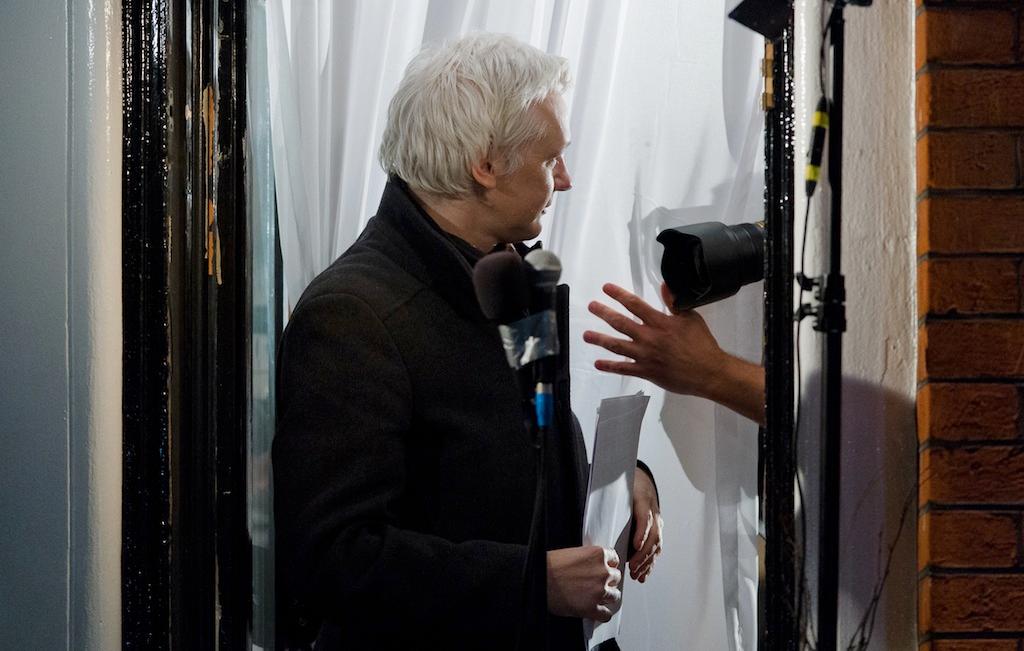WikiLeaks goes to Hollywood
Wikileaks founder Julian Assange gestures as he addresses members of the media and supporters from the window of the Ecuadorian embassy in Knightsbridge, west London on Dec. 20, 2012.
That didn’t take long.
The Fifth Estate, an upcoming drama about WikiLeaks and its infamous leader, Julian Assange, made its media debut Wednesday when a photo of co-stars Benedict Cumberbatch (Assange) and Daniel Brühl (Daniel Domscheit-Berg) was released.
But this origin story is no indie production. In fact, the Dream Works Studios film is packed with mainstream Hollywood power: directed by Bill Condon and starring actors like Laura Linney and Downton Abbey’s Dan Stevens.
There's more than a tinge of irony in a big-budget film cashing in on a nonprofit intended for the public interest.
Not to mention the news this past weekend that the WikiLeaks movie script had been leaked to none other than Julian Assange.
The movie itself and the limelight Assange and WikiLeaks garner now overshadow the government and corporate malfeasance they uncloak. Why read embassy cables when you can watch the movie about the enigmatic white haired man hiding in Ecuador’s embassy in London?
More from GlobalPost: WikiLeaks movie script leaked to… Julian Assange
Assange — still holed up in Ecuador's London embassy — slammed the film dramatically, saying in a statement:
"It is a mass propaganda attack against WikiLeaks, the organization (and) the character of my staff." WikiLeaks' Twitter feed, meanwhile, lambasted the film for its "geopolitical agenda."
Like many things small and independent that become famous, WikiLeaks has been subsumed by the very systems it purported to transcend.
As the film's title suggests, the whistle-blowing website is characterized as a supplement to the fourth estate — i.e., the free press, dubbed so by Edmund Burke in 1787 when Britian's House of Commons opened to the media.
In this time of unhappy newspaper cutbacks and fewer dollars for investigative journalism, there’s probably something to that historical reference. Interviewing Assange in July 2010, TED Curator Chris Anderson said WikiLeaks in the last few years was reported to have released more classified documents than the world’s media.
But WikiLeaks' raison d'etre, the so-called failure of media to hold up its social contract, is more than a little mocked by such Hollywood treatment. (The November release date suggests the studio is going for awards.)
More from GlobalPost: WikiLocked
The film is based in part on Daniel Domscheit-Berg’s book, "Inside WikiLeaks: My Time with Julian Assange and the World’s Most Dangerous Website," and "WikiLeaks: Inside Julian Assange’s War on Secrecy" by journalists David Leigh and Luke Harding.
Condon, the director, said his film "won't claim any long view authority on its subject, or attempt any final judgment.”
He added, "It may be decades before we understand the full impact of WikiLeaks and how it's revolutionized the spread of information.”
Is WikiLeaks good or bad for the world? That question will live in perpetuity, and Condon is right to ask it. But in this case, philosopher Marshall McLuhan’s famous dictum, “The medium is the message,” has much to tell.
We want to hear your feedback so we can keep improving our website, theworld.org. Please fill out this quick survey and let us know your thoughts (your answers will be anonymous). Thanks for your time!
